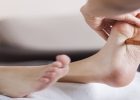Creatine is a naturally occurring amino acid that is found in meat and fish, and also made by the human body in the liver, kidneys, and pancreas. It is converted into creatine phosphate or phosphocreatine and stored in the muscles, where it is used for energy.
Creatine is primarily used by athletes to be able to train harder and longer! Few people though realize that creatine has other uses. Some of the other uses are:
Creatine for heart disease
A clinical study suggests that creatine supplements may help lower levels of triglycerides in men and women.
In few other clinical studies of people with heart failure, those who took creatine, in addition to standard medical care, were able to increase the amount of exercise they could do before becoming fatigued, compared to those who took placebo. Getting tired easily is one of the major symptoms of heart failure. One clinical study of 20 people with heart failure found that short-term creatine supplementation in addition to standard medication lead to an increase in body weight and an improvement of muscle strength.
Creatine has also been reported to help lower levels of homocysteine. Homocysteine is associated with heart disease, including heart attack and stroke.
Creatine for Chronic Obstructive Pulmonary Disease (COPD)
Chronic obstructive pulmonary disease (COPD) is one of the most common lung diseases. If you have COPD you have difficulty breathing. There are two main forms of COPD:
Chronic bronchitis, is a long-term cough with mucus
Emphysema, involves destruction of the lungs over time
Most people with COPD have a combination of both conditions.
In one double-blind study, people with COPD who took creatine increased muscle mass, muscle strength and endurance, and improved their health status compared with those who took placebo. They did not increase their exercise capacity. More studies are needed to see whether creatine has any benefit for people with COPD.
Creatine for Muscular dystrophy
The muscular dystrophies (MD) are a group of more than 30 genetic diseases characterized by progressive weakness and degeneration of the skeletal muscles that control movement. Some forms of MD are seen in infancy or childhood, while others may not appear until middle age or later.
People who have muscular dystrophy may have less creatine in their muscle cells, which may contribute to muscle weakness. One study found that taking creatine led to a small improvement in muscle strength. However, other studies have found no effect.
Creatine for Parkinson’s disease
People with Parkinson’s disease have decreased muscular fitness including decreased muscle mass, muscle strength, and increased fatigue. A small clinical study found that giving creatine to people with Parkinson’s disease improved their exercise ability and endurance. In another clinical study, creatine supplements boosted participants’ moods and they didn’ t need to increase their medicine dose as much as those who didn’ t take creatine. More research is needed in this area.
Creatine has been used primarily since the mid 80′s, so it is relatively new and that is part of the reason that many outside of the sport world are not familiar with creatine!




